Earth Day Celebration
Air Date: Week of April 18, 2025
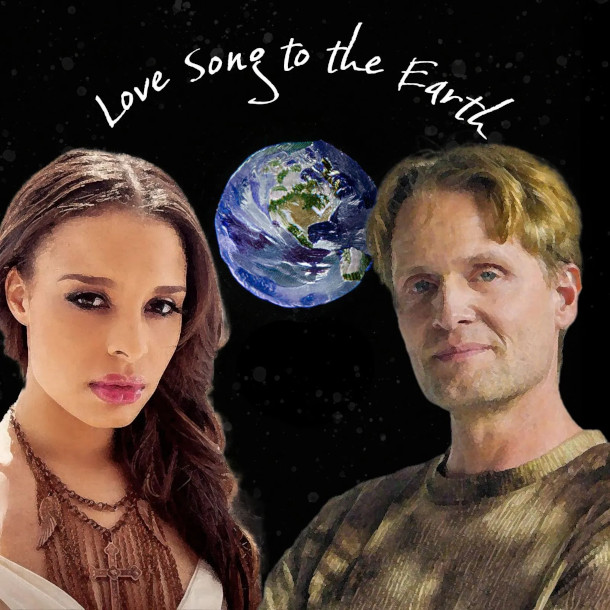
Antonique Smith collaborated with songwriter Toby Gad on the remake of Love Song To the Earth, which was released in early 2025. She has been performing the song as part of the Climate Revival Tour. (Photo: Climate Revival)
Living on Earth is celebrating 55 years of Earth Day, kicking off with a conversation with Grammy nominated singer and Earth Day ambassador Antonique Smith. Her work uses the art of storytelling and music to promote environmental justice and climate action in communities of faith and color. Host Steve Curwood spoke to Antonique Smith about using culture and artistry to combat climate change.
Transcript
CURWOOD: From PRX and the Jennifer and Ted Stanley Studios at the University of Massachusetts Boston, this is Living on Earth. I’m Steve Curwood.
BELTRAN: And I’m Paloma Beltran.
Today we are celebrating 55 years of Earth Day, One paradox of the ongoing climate crisis and the epidemics of illness from toxic exposure is that few of the people most affected are engaged in the search for solutions. 2025 Earth Day Ambassador Antonique Smith is working to change that.
CURWOOD: Antonique grew up in the predominately black community of East Orange, New Jersey before her beautiful voice and captivating stage presence made her a star on Broadway, a Grammy-nominated singer, and an acclaimed actor in cinema and on television. Since becoming an activist more than a decade ago she has focused her work on communities of faith and color, using stories, art and culture to combat climate change, and promote environmental justice.
BELTRAN: Author Bill McKibben calls Antonique Smith the “voice of the movement.” She recently founded Climate Revival with the Rev. Lennox Yearwood Jr., head of the Hip Hop Caucus, and they tour the nation calling for sustainability and the protection of people and the planet. And she’s on the line now from East Orange, New Jersey.
CURWOOD: Antonique Smith Welcome to Living On Earth!
SMITH: Thank you so much.
CURWOOD: So here we are in April of 2025, Earth Day.
SMITH: Yes! Woo!
CURWOOD: So, hey, what does it mean for you to be an Earth Day ambassador?
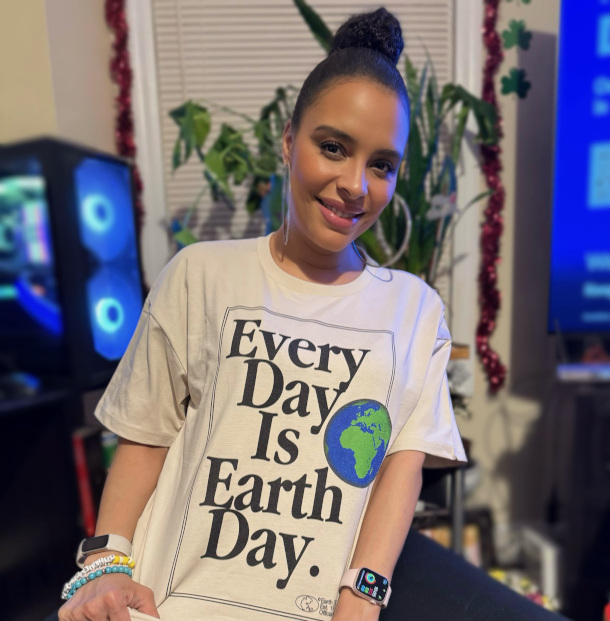
Actress, singer and activist Antonique Smith is an Earth Day 2025 Ambassador. (Photo: Courtesy of Antonique Smith)
SMITH: Ah, its an honor. It's really an honor. It's the 55th anniversary this year. You know, this ain't a new thing. Earth Day has been around a billion people strong for 55 years, and so for them to ask me to be Ambassador this year is quite an honor. This year we are focused on Earth Action Day. It means that we want everybody around the world to pick something big or small. You know, you got some folks who are like, I'm gonna install some solar panels on my roof. Okay, great. But you got some other folks that ain't gonna be able to do that, and all they gonna be able to do is put a song on Instagram, my song, love song to the earth. They could use my song and make a video showing everybody what they love, who they love, places they love. Like, it could be something small as that. It could be something as big as planning a march, the next march, to get everybody out, to hit the streets. It could be starting a petition to help people reach out to their to the people they voted for, to hold them accountable for this mess. It's just so many things that people can do. So what's amazing is earthday.org has actually listed a lot of cool things, big and small, that people can do to participate in Earth Action Day. Just choose something and hashtag Earth Action Day. We're shouting people out. We're showing love because we want everybody to be excited. Every day is Earth Day. So of course, April 22 is the actual day, but every day is Earth Day, you know? And so we need to love our planet and love each other, which is the same, because if we don't love this planet, we don't take good care of what of this, only one home that we have, the only home we have, if we don't take care of it, we will get booted off this thing.
CURWOOD: So now, where are you going to be performing on Earth Day?
SMITH: In Times Square. In Times Square! It starts at 1130 so it's like, you know, come on out on your lunch break. It's also going to be streaming a bunch of places. But for those who are like, right there in the area, come through, I will be doing like, three songs, and a little Q and A, and Rev is gonna, um, do a little, you know, short feat. It's, he's always tears you up, even though, I don't care if it's five minutes, he gonna tear you up. So it's going to be very powerful, and there'll be other people doing things. So, yeah, come through. Come through early, come in the beginning.
CURWOOD: That first Earth Day 20 million people in the United States showed up for that first Earth Day.
SMITH: Yeah!
CURWOOD: What's happened since then?
SMITH: Lord, I think people... Between people, just, I don't know, people, technology, everybody's too busy. We're even too busy to be with each other. Community is even suffering in a way that we're not used to, you know, and the pandemic definitely didn't help, because it kept us all siloed and separated and isolated and quarantined, you know, it just it made it so that we are not as close to one another as we used to be. People aren't as close to the earth as they used to be. They're not spending as much time outside and appreciating the beautiful. I mean, I mean, honestly, with these weather patterns, it's a lot less beautiful weather. It's kind of crazy. Everywhere. It's crazy!
CURWOOD: Now you are a talented singer and Broadway TV and movie actor. When did the health of our environment first become important to you?
SMITH: Hmm, 11 years ago, when the person who actually co founded my organization with me last year, Reverend Yearwood, also in the room that night was Bill McKibben, but I was asked, because I'm a singer, I was asked to come sing on the very first album about climate change. It's called Heal our Mother Earth, the album HOME. And it was like me and not at the studio that night, these guys weren't there. But Ne-Yo was on the album, Kama was on the album, Crystal Waters was an amazing set of people on this album, and I was asked to sing Mercy, Mercy Me. So I came just to do my thing. I was just gonna come and sing my song and going home. Because all I knew about climate change at the time was, you know, polar bears and ice glaciers, and it didn't feel urgent, didn't feel important, didn't feel like something I needed to be concerned about. But I'm a singer, so I was gonna go sing my little song. Thankfully, Rev Yearwood who is, you know, at this point, he is Forbes 50 top sustainability leader and many, many other accolades, but he sat me down before he let me do the song because the Hip Hop Caucus was producing... People's Climate Music was producing the album. So he wanted people to know what was really happening. And I have so much respect for that, because, you know, sometimes people bring celebrities in, they don't want to take up too much of their time, so they just let them do what they came to do and leave. But he really wanted people to know what was going on. So when he started talking about Superstorm Sandy... This was 11 years ago, so when he started talking about Superstorm Sandy, he started talking about this power plant that's in that's on the Turnpike, that's horrible smell that everybody from this area knows about, and the fact that climate change isn't just about those things. It's not just about polar bears and ice glaciers. It's about me and my family and my community and my people who were dying of cancer and asthma because of the pollution in our neighborhoods, that same pollution those power plants that are in our neighborhoods, they call us the sacrifice zones, those power plants and petrochemical factories and all of that pollution that they put right in our neighborhoods is what's causing climate change. So I was like, Wait a minute. Now, first of all, I didn't know that was pollution. I didn't know that those power plants were harming my community the way it was. And I didn't know that these storms, these crazy storms, and all this crazy weather patterns we were starting to face at that time, not, I mean, nowhere near what we're facing now, unfortunately, and it's only gonna get worse until we act on it. But those storms and this crazy weather, all that stuff, all of that's connected to the pollution, like the pollution is what's causing that. And I was, like, taken aback, and when I tell you, I joined the movement that night and never looked back like that night changed my life. I could not not do something understanding the impact that this was having on not just me and my family, my loved ones that I love. I mean, I'm very much a family person, and to understand that the cancers in my family and the lupus and the lung disorders, and I just was like, oh my god, this is impacting me directly. This is personal to me now. It became personal to me that night.
CURWOOD: So, you grew up in Orange, East Orange, New Jersey.
SMITH: East Orange, yeah.
CURWOOD: So, coming up, how had that shaped your outlook towards the environment and the climate crisis? Sounds like you really weren't paying a whole lot of attention.
SMITH: Not at all, nope, not even a little bit. I didn't think it was a fact. I didn't think it was something we should be concerned about. I mean, even if you think the sea level's rising like we're I'm not on the Jersey Shore. We don't live near the beach. So it just everything about it that I had learned. And that's also a bit of a failure of the of the climate movement, and it's something we're trying to actively fix. That's part of literally, what I do in this movement is the people being affected, first and worst, which are people of color in poor communities, they don't think it's their issue. We've been taught almost, that it's not our issue, that it's not something that we need to be concerned about, that is not something that's killing us, that is affecting us right now, and it's not just a future problem. It is a future problem that the whole world is being affected by, because our existence on earth is in jeopardy, full stop. We are in a climate crisis. But even if you just like, okay, that could be some years, you know, people could be thinking, I ain't even gonna be here by then. You know, you could have people thinking like that, well, let's, let's not even go to the future. Let's talk about right now. Let's talk about the pollution in your neighborhoods. Let's talk about the plastic that you're ingesting. We're all ingesting a credit card size worth of plastic in our bodies every single week, and the petrochemical industry wants to triple production, y'all. So it's our issue, because it's our neighborhoods that these factories are in, and it's our bodies that are ingesting. It's in our food, it's in our water, it's in the air, it's in the rain we used to have, remember we used to have acid rain back in the day? Well, now we got plastic rain. It's our issue, and people of color need to be on the forefront of this movement. And so my whole thing is about informing them. I need to make it hit home for them, for everybody, the way it was brought home for me, because I never looked back when I found out that it was affecting me that way, that it was personal, I never looked back. And I find that when we do that people are changed by it, and they want to know, what do I do now? What do I do?
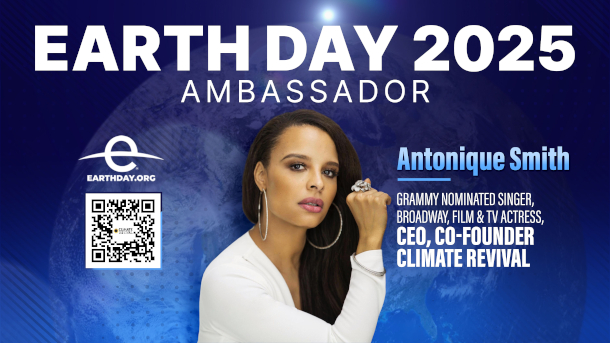
An announcement of Antonique Smith as an Earth Day 2025 ambassador. (Photo: Courtesy of Antonique Smith)
CURWOOD: So, what is keeping people from understanding this? You know, you had this sudden awakening, and you had a very high level awakening. You had Bill McKibben, you had Reverend Yearwood. You had some pretty high power people. What about just plain ordinary folks? What's keeping them from seeing the crisis?
SMITH: They're not being reached. There's two things. So there's the fossil fuel industry and their propaganda. For sure, they want to make sure that everybody thinks, oh, none of this is real or none of this is a real problem, like it's not. You dont need to worry about that. That is, they spend billions of dollars programming people to think this is not a problem. It's nothing to worry about. Then bless the climate movement's heart. They spent so many years making it about polar bears, ice, glaciers and the trees and the beauty, the beautiful earth is beautiful. We love the trees, the animals, the flowers. We love the mountains. We love all of it. But they have not made it about the people, and they especially have not made it about people of color, the people suffering from this the most. So, that is why, that's why people don't know, because people have not been we thought we have to go to them. We are going we are on the ground. We are like grassrootsing it, because that's right now. The only way to do it as we scale up, though, the goal is to make more music, more films and television shows, to reach our communities, to help them understand what's going on, but the first and fastest way to do it was to just get on the ground and like, we're going to people's churches, and we're doing like, what we call climate revivals, and I'm singing, doing gospel songs. I speak in between, they leave fully understanding what the problem is, and they're inspired to start to act. I sing and speak and then Rev Yearwood closes it out with a rousing sermonette. It's very effective, and the goal is to just keep doing more of them. We went on a tour. We did eight cities last year, and the goal is to do eight more this year, and then as much more as we can, because people need to know they're just they're not being told.
[MUSIC: Kim Bo, “Love Song To The Earth (Piano Cover)”]
CURWOOD: Coming up, Earth day ambassador, Antonique Smith on the intersection between environment, faith, storytelling and art. Stay tuned to Living on Earth.
ANNOUNCER: Support for Living on Earth comes from Sailors for the Sea and Oceana. Helping boaters race clean, sail green and protect the seas they love. More information @sailorsforthesea.org.
[CUTAWAY MUSIC: Kim Bo, “Love Song To The Earth (Piano Cover)”]
BELTAN: It’s Living on Earth, I’m Paloma Beltran.
CURWOOD: And I’m Steve Curwood.
We’re back now with Earth Day Ambassador, singer, actor, and activist, Antonique Smith.
CURWOOD: Let's go back to 2014, you were featured on the first ever climate change album!
SMITH: Yes, yes!
CURWOOD: HOME, Heal our Mother Earth.
SMITH: Yeah!
CURWOOD: People's Climate music, I think was the producers there. So, I want you to talk to me about your Love Song to the Earth. What's the inspiration behind that song?
SMITH: So, it was written by my friend Toby Gad and for me at this point, we started talking about doing it last year. It was written by him and Natasha Benningfield, and they had put it out with, like, Paul McCartney and Gerald, like, a bunch of like, amazing, like, really big, amazing people. And it was like, kind of a We Are the World type of song. And so me and Toby were talking about it, and we were just like, I should sing this my way. I just do my Antonique version. And it was perfect timing, because I had just started Climate Revival last year. I started Climate Revival. We officially launched September 13 last year. And so it was around that time we were like, this would be a really perfect time to put this song for me to put this song out. So we ended up recording it, and it came out in February, end of February, so pretty much a little over a month.
CURWOOD: So, let's take a moment to hear your song.
SMITH: Oh, yes, Love Song to the Earth.
[MUSIC: Antonique Smith & Toby Gad, “Love Song to the Earth” Sundance ASCAP Music Café]
CURWOOD: I've noticed over the years that if you go to a largely white environmental gathering, there's no prayer or invocation, or anything. If you go to a largely black or person of color gathering on the environment, they almost invariably start with a prayer, or sometimes an invocation, often a minister. And of course, some of the most important leaders in the environmental justice movement, like Reverend Ben Chavis, ministers. Um, why is that? Why is it that brown America wants to bring God into the question of the environment and the climate and over generalizing white America doesn't seem as interested?
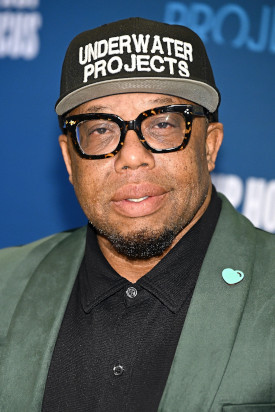
The Rev. Lennox Yearwood Jr., Hip Hop Caucus president and co-founder of Climate Revival, has been on a mission with Antonique Smith to alert people of color and faith communities to the dangers of climate change, as well as the need for environmental justice and a future built on sustainable energy. (Photo: Courtesy of Rev. Lennox Yearwood)
SMITH: Because that is how we always made it through. I mean, our people, that's how we you know, our faith is what got us out of slavery. Our faith is what got us to where we are today. We lean on our faith a lot more, I think, than some other people need to some other folks out here and not just leaning on faith, but also understanding that in movements. I mean, if you think about the Civil Rights Movement and so many other movements that we won, but those other movements that we've won in the past were very much faith led. I mean, if you think about Martin Luther King, he was organizing in churches, and it's because our people have a understanding of we are going to need God's help. We are going to need that higher power in this very situation, like just because we're not meeting about church doesn't mean we don't need God to be fully weighed in and supportive of what we're doing. And so that, I think, is why we have a tendency to lean into that in this movement. Because we know we need it. We know we need God's help. We know that victory is mine when we bring God in. You know, we know that we can't depend on man. That's man is kind of the problem, and lack of love is also the problem. I mean, when you think about it, like one of my favorite scriptures to talk about, first of all, two of them. You know, my people perish for a lack of knowledge. So that's the core of the problem. Is people don't understand. The other core of the problem, that's the cause. The foundational cause of this whole issue is a lack of love. The Bible says, Jesus said the two most important commandments, the two greatest commandment is to love God and to love your neighbor as yourself. That's how important it is to love each other. And if we love each other, if there was more love, then there wouldn't be a climate crisis. If there was more love, you know, there wouldn't be all this pollution in our neighborhoods, because that's greed. People are making trillions of dollars off of this pollution, quote, unquote. And if there was more love, then profits wouldn't be more important than people. So, our two greatest problems in this movement and in this world is, for in the movement, I would say, is lack of knowledge and a lack of love. But then as a whole, because if you think about all the issues, if you think about all of the rights that they're taking away. If you think about all the, you know, the just everything's going on right now, it's all that's all a lack of love. God didn't call us to judge each other. He called us to love each other.
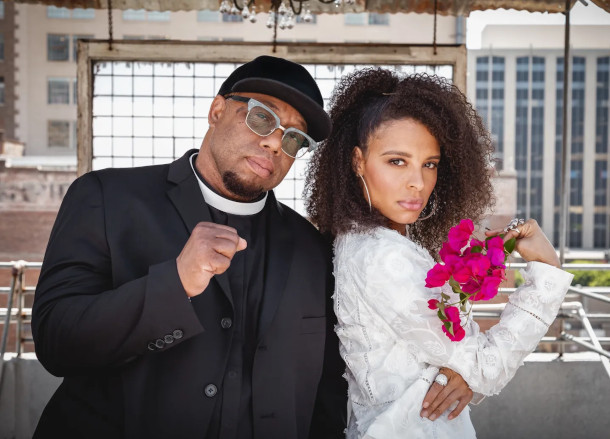
Rev. Lennox Yearwood, Jr. , head of the Hip Hop Caucus, and Antonique Smith co-founded Climate Revival, a nonprofit with the mission of informing communities of color and people of faith about the climate crisis, the need for environmental justice and a healthier, more sustainable environment. (Photo: Damu Malik))
CURWOOD: So, you're the CEO and Co-Founder of Climate Revival. So tell me, what are you trying to accomplish with climate revival?
SMITH: So, kind of the same thing that I've always been trying to accomplish for the last 11 years, as with my artivism, is to inform and to inspire, but specifically, climate revival is targeting people of faith and people of color. Rev and I, who he co founded it with me, we were inspired by the way Martin Luther King was organizing in church, you know. And then there's this photo that really got me of him locked in arms with a rabbi and a priest. And it was just like that, you know. And they were like, locked in arms, I got a protest, you know, like a march. And that was so powerful to me, because it showed just in that one picture, how important faith is in the fight. We need our faith not just to keep us going, because that's important. I mean, we just, Lord, we need our faith just to keep us... I was talking to somebody today, and she was just like, you know, she's saying she feels very numb. And I said, I understand you're numb because you won't be able to function if you really take in all day long, all of the chaos and craziness. But the thing that people of faith have to lean on is not the numbness. It's God. It's casting our cares on Him. It's saying, God, this is crazy. I can't focus on this. I can't think about it. I do not want to feel this. Here, God, work this out. Help us. Work this out. God, handle this for us. Father. That is some of my prayers. Every day. I'm like, God, it's crazy out here, Lord, I cast my cares on you. I thank you that you care, and I know that you working all things out for my good. And that's the kind of thought process that people of faith have. No matter what the faith is, you know, they believe in a higher power that somebody else, larger than us, more powerful than us, more all-knowing than us, is in control of the situation, because it feels so out of control right now. And so it is the faith that God is actually in control that is what keeps us going. And we started in the black church, because we black, and we grew up in the black church, you know, he's a reverend, and I grew up singing in the choir, and so that's our wheelhouse, and those are the people we know that we can most easily reach because we're speaking their language. I'm doing a gospel concert, and Rev is doing a sermonette, and we have other speakers sometimes, you know, and they speak in between, and we also speak, I mean, we've done conferences, we've done schools, we've done, you know, so it's not all always in a church, and it's not always gospel music. That's definitely when we're in church, but it's about bringing people of faith together to use our faith in God to not only strengthen us, but to actually lead us and guide us and be the power that we move with in the movement. Like God help us win this, turn the hearts, the hearts of The King, is in the hand of the Lord. Turn these hearts, turn the hearts in the White House, turn these hearts in Congress, turn these hearts in the Senate, turn these hearts in the Supreme Court, God. So that things are going to be better for your people on this earth. That is the basis of Climate Revival in trying to inform people about the pollution, about climate change, with the lens and the foundation of their faith.
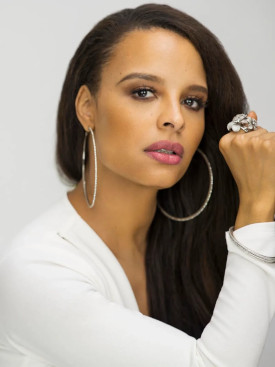
Actress, singer and environmental activist Antonique Smith is the 2025 Earth Day Ambassador. She will perform in Times Square on Earth Day, April 22. (Photo: Kwaku Alston))
CURWOOD: So, I noticed that you have what you call an End Fossil Fuels handout campaign as part of the Climate Revival, what's that all about?
SMITH: So, these fossil fuel companies are making like, a trillion dollars a year, and they're also on top of that. On top of those profits, they're making record profits. They're doing really well, right? On top of that, the government is giving them $20 billion a year in tax breaks and subsidies. It's crazy. The money that should be in our communities, going to our schools, you know, like right here in East Orange, we had an issue last year where we had the city had to let go of like 90 teachers, or something crazy. It was like some really sad number because they didn't have the money. Well, the money went to the fossil fuel industry. In tax breaks and subsidies where it should be in our communities, going towards infrastructure, going towards education, going towards making our communities better and more vibrant, and giving us the things that we need to live happy, healthy lives in our neighborhoods. It's going to these guys so they can get an extra yacht. Tom, don't need an extra yacht. I'm sorry. You know, Tom already has a yacht. He don’t need a bigger yacht. Our communities, our schools, we got food deserts. There's all kinds of stuff going on in our communities, and the money should be going here, not there. But I'm also so very passionate about stopping fossil fuels altogether, about getting them out of our neighborhoods completely, definitely, about stopping them from putting more factories in plants. We definitely not with that, but I want to get the ones that's in our neighborhoods out of here, because there's a way that they could power and everything that we need could be done clean, where people don't don't get killed. And I'm not saying I'm I'm not anti-billionaire. I'm not anti-super-yacht. I'm anti people dying for people to get those things. If you're killing people to be a billionaire, that's not cool to me. There's a way to make your money that is not harming people.
CURWOOD: Indeed. So, we don't have Reverend Yearwood here. The Reverend Lennox Yearwood.
SMITH: Shout out to Rev!
CURWOOD: the Hip Hop Caucus, who is your partner in much of this...
SMITH: Yes!
CURWOOD: If he were here right now, what would be the one line you would hope he would deliver to bring this home?
SMITH: Oh, my God! Organized people beat organized money every time. So although it does feel like we're in a David and Goliath battle with these rich billionaires and their power and their organized money that they are absolutely using against us. Organized people beat organized money every time. So that just is on us, y'all. To come together. We have the power. If we come together, we have the power to make the world the way that we want it to be, the way that we dream to be. We know the way that we know that it can be. It's on us.
CURWOOD: What’s next for your environmental activism? Seems like you're very busy right now, so I think your schedule is pretty full. But when you lie awake at night, before you go to sleep, and dream of what you might do next, what comes up?
SMITH: I mean, there's a lot, and we're actually putting together, we're in the midst of putting together a small tour. So there'll be a lot more cities in Texas and Ohio, in Pennsylvania, and also, on a grander scale, moving more into content creation, like movies and television shows, like we need more. Right now, I'm watching a show called Paradise on Hulu starring Sterling K Brown, who's an amazing actor, but the show is incredible. Show is incredible, and it has a climate change lens on it, but it doesn't feel like you're watching a quote, unquote, climate change show. It's just an incredible drama like a who done it, and we need more content like that. We need to normalize talking about all of these issues in a way that is weaved into just great storytelling.

EarthDay.org’s official Earth Day 2025 poster, created by artist Alexis Rockman to mark the 55th anniversary. (Photo: Courtesy of EarthDay.org)
CURWOOD: Antonique, before you go tell me what... What gives you hope?
SMITH: My faith, just knowing that all things are possible, knowing that there's always a possibility that we win this thing, my family, spending time with my family, my friends, and just believing that by using the gifts that God gave me and the whole purpose he put me on earth is to make an impact. And so just doing that, that, just continuing to do that, gives me hope.
CURWOOD: Antonique Smith, Grammy nominated, singer songwriter, Broadway, Film TV actor, the CEO of Climate Revival, and of course, these days, a social climate, environmental justice activist and Earth Day ambassador. Thanks so much for taking the time with us today.
SMITH: Thank you so much. This is wonderful. Thank you for having me.
Links
Learn more about Earth Day 2025 Ambassador Antonique Smith
Living on Earth wants to hear from you!
Living on Earth
62 Calef Highway, Suite 212
Lee, NH 03861
Telephone: 617-287-4121
E-mail: comments@loe.org
Newsletter [Click here]
Donate to Living on Earth!
Living on Earth is an independent media program and relies entirely on contributions from listeners and institutions supporting public service. Please donate now to preserve an independent environmental voice.
NewsletterLiving on Earth offers a weekly delivery of the show's rundown to your mailbox. Sign up for our newsletter today!
 Sailors For The Sea: Be the change you want to sea.
Sailors For The Sea: Be the change you want to sea.
 The Grantham Foundation for the Protection of the Environment: Committed to protecting and improving the health of the global environment.
The Grantham Foundation for the Protection of the Environment: Committed to protecting and improving the health of the global environment.
 Contribute to Living on Earth and receive, as our gift to you, an archival print of one of Mark Seth Lender's extraordinary wildlife photographs. Follow the link to see Mark's current collection of photographs.
Contribute to Living on Earth and receive, as our gift to you, an archival print of one of Mark Seth Lender's extraordinary wildlife photographs. Follow the link to see Mark's current collection of photographs.
 Buy a signed copy of Mark Seth Lender's book Smeagull the Seagull & support Living on Earth
Buy a signed copy of Mark Seth Lender's book Smeagull the Seagull & support Living on Earth

